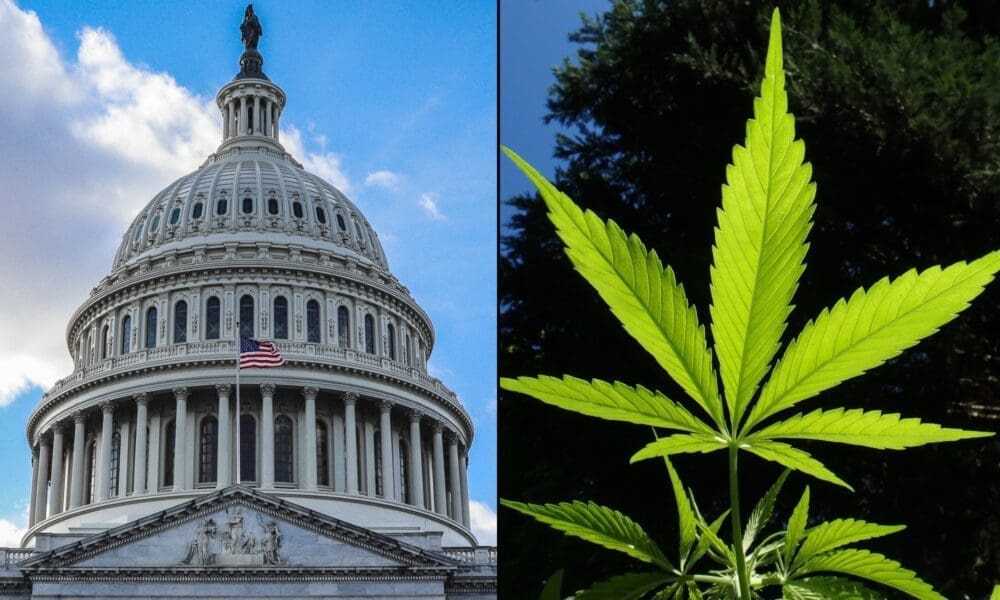Bipartisan congressional lawmakers have reintroduced a pair of bills meant to automatically seal criminal records for certain non-violent federal marijuana offenses and to provide assistance for states in removing records for similar convictions.
Sen. Lisa Blunt Rochester (D-DE) and Rep. Laurel Lee (R-FL) are leading the reform push for the latest versions of the Clean Slate Act and Fresh Start Act, alongside other bipartisan and bicameral members.
“I call this my strange bedfellows bill, because when you look around at who is present, it is people who have felt and been through the process,” Blunt Rochester said at a press briefing on Wednesday. “It is people who have fought and advocated. It is Democrats, Republicans and independents. It is from all parts of the country that we see this.”
The legislation is “about redemption, but it’s also about the economy,” she added, noting the broader financial impact of putting up barriers to employment and housing for people with certain convictions on their records.
She added that the lead GOP cosponsor of the Clean Slate Act will be Sen. Rand Paul (R-KY).
The Clean Slate Act has been filed over the last several sessions, and one version advanced through the House Judiciary Committee in 2022 but was not ultimately enacted.
It would mandate the automatic sealing of criminal records for certain non-violent, federal marijuana convictions. And it would also provide relief to people who have been arrested for other offenses that did not result in a conviction.
The bill would establish a new process for people to petition the courts for record sealing for non-violent offenses that aren’t eligible for automatic sealing. They could repetition for relief after two years if the court denied their initial request.
Further, district courts would be able to appoint a public defender to assist “indigent petitioners” process their requests for record sealing.
The Fresh Start Act, meanwhile, would provide federal funding to states that create their own systems of automated expungements. Though it does not specify the types of crimes that would warrant relief, a growing number of states are taking steps to implement systems of automatic expungement for marijuana convictions, and those states would benefit from the new funding.
It would also preclude states that delay expungements or record sealing over outstanding fines and fees from receiving the grant funding through the National Criminal History Improvement Program (NCHIP).
States would also be mandated to “report the number of records that have been sealed or expunged, broken down according to race, ethnicity, and gender,” according to a summary from The Clean Slate Initiative, which has championed the legislation and organized Wednesday’s press event.
Rep. Sydney Kamlager-Dove (D-CA) and Lucy McBath (D-GA) also participated in the briefing on Wednesday.
—
Marijuana Moment is tracking hundreds of cannabis, psychedelics and drug policy bills in state legislatures and Congress this year. Patreon supporters pledging at least $25/month get access to our interactive maps, charts and hearing calendar so they don’t miss any developments.
Learn more about our marijuana bill tracker and become a supporter on Patreon to get access.
—
Meanwhile, advocates are hoping to see more clemency work at the executive level.
To that point, an activist who received a pardon for a marijuana-related conviction during President Donald Trump’s first term paid a visit to the White House last week, discussing future clemency options with the recently appointed “pardon czar.”
Other former marijuana prisoners who received clemency from Trump separately staged an event outside the White House earlier this month, expressing gratitude for the relief they were given and calling on the new administration to grant the same kind of help to others who are still behind bars for cannabis.
Bipartisan congressional lawmakers have reintroduced a pair of bills meant to automatically seal criminal records for certain non-violent federal marijuana offenses and to provide assistance for states in removing records for similar convictions. Sen. Lisa Blunt Rochester (D-DE) and Rep. Laurel Lee (R-FL) are leading the reform push for the latest versions of the Clean Read More


